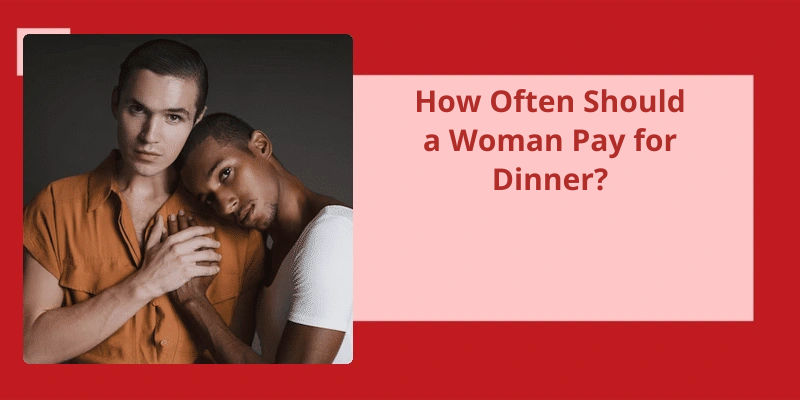It's a question that’s been debated for years – how often should a woman pay for dinner? The idea of who pays for meals on dates can be a touchy subject, with many societal expectations and traditional gender roles still in play. Some argue that men should always pay as a show of chivalry and respect, while others suggest that splitting the bill or taking turns paying is the fairer option. In modern times, there’s no clear-cut answer, as different cultural norms, financial situations, and personal preferences come into play. Ultimately, the decision of who pays for dinner should be discussed and agreed upon by both parties in a relationship or situation.
Should a Man Let a Woman Pay for Dinner?
However, in todays society where gender norms are gradually evolving, it’s becoming more acceptable for women to offer to split the bill or even pay for the entire meal. This shouldn’t be interpreted as an affront to the mans masculinity or ability to provide. Rather, it should be seen as a gesture of equality and mutual respect.
Furthermore, it’s important to consider the context of the situation. If the man is financially struggling or the woman has significantly more disposable income, it may be more appropriate for the woman to offer to pay. Additionally, if the two individuals are in a long-term committed relationship, it may make more sense to alternate who pays for meals or split the bill equally.
Ultimately, the decision of who pays for dinner should be based on communication and mutual understanding between the two individuals involved. It shouldn’t be a source of stress or contention, but rather a simple matter of practicality and courtesy. Both parties should feel comfortable discussing their preferences and financial situations, rather than assuming traditional gender roles.
When it comes to first date etiquette, the question of who should pay for the meal can be a tricky one. While some may argue that it’s traditional for the man to foot the bill, others maintain that it’s only fair for each person to pay for their own meal. However, as a general rule of thumb, whoever initiated the date should be the one to pay for the meal. But regardless of who pays, the most important thing is to focus on enjoying each other’s company rather than stressing over who’s picking up the check.
Should I Pay for Her Meal on the First Date?
Asking someone out on a first date can be stressful and cause a lot of anxiety. One question that often arises is whether or not the person who initiated the date should pay for both meals. The general rule of thumb is that whoever asked for the date should cover the bill. This is considered a polite gesture and shows that you value your dates company.
However, it’s important to remember that this rule can be broken if your date insists on paying for their own meal. Some people may feel uncomfortable accepting a free meal from someone they barely know. Ultimately, it’s important to respect your dates wishes and do what feels comfortable for both of you.
Another factor to consider is your financial situation. If youre on a tight budget or struggling financially, it’s understandable that you may not want to foot the bill for both meals. In this case, it’s important to communicate with your date and discuss your limitations. It’s better to be honest and open about your financial situation than to put yourself in a difficult financial position.
Ultimately, the decision on who pays for the first date meal comes down to personal preference and cultural norms. It’s important to be aware of these cultural differences and respect them.
However, this societal expectation has caused much confusion and debate over whether women should be expected to pay for dates. While some argue for paying as a signal of independence and equality, others believe it reinforces traditional gender roles. Regardless, it’s important to consider your own values and the dynamics of your relationship when deciding who should pay for a date.
Should a Girl Pay for Date?
However, this doesn’t necessarily mean that women should cover the entire cost of the date. It’s important to remember that dating is a two-way street, and both parties should be willing to contribute in some way. This could mean splitting the bill evenly, taking turns paying for dates, or even coming up with creative and budget-friendly date ideas that both people can enjoy without breaking the bank.
Ultimately, the decision of whether or not a girl should pay for a date should be based on individual circumstances and personal preferences. For example, if a woman is the one who initiates the date or suggests an activity that’s more expensive, it might be more appropriate for her to offer to cover the cost. On the other hand, if a man has specifically planned and taken the lead on the date, it might be more appropriate for him to pay.
It’s also important to remember that the act of paying for a date shouldn’t be seen as a way to assert control or dominance over the other person. Rather, it should be seen as a gracious and respectful gesture of appreciation for their company and time.
At the end of the day, the most important thing is to communicate and be open about expectations and preferences when it comes to dating expenses. By having an honest and upfront conversation, both people can feel more comfortable and confident in their financial contributions to the relationship.
Source: When should a woman offer to pay for a date?..
However, this traditional approach to splitting the bill may not be fair to everyone involved, especially for couples who end up paying more than their fair share. This has led to a debate on whether couples should pay for their own meals or if the bill should be split equally among all parties, regardless of their relationship status. Let’s take a closer look at the arguments for and against couples paying for their own meals.
Should Couples Pay for Their Own Meals?
However, this can lead to resentment and unfairness among the group. For example, if one couple orders expensive dishes and drinks while another couple only orders water and an appetizer, the latter couple may feel they’re being taken advantage of by having to split the bill equally. All parties involved should be responsible for their own expenses and not burden others with their own indulgences.
Furthermore, the decision to split the bill equally can also put a strain on relationships. For instance, if one couple typically earns less than the others or their finances are tight, splitting the bill equally could cause them to feel uncomfortable and unable to be truthful about their financial struggles. In this way, letting each party pay for themselves ensures that everyone is responsible for their own expenses while also preserving relationships.
Another aspect to consider is the concept of a “date night.”. When couples go out for a meal together, it’s often a significant occasion meant to be romantic and intimate. If the bill is split equally among all parties, it takes away from the specialness of the occasion and can make it feel less personal. By allowing couples to pay for their own meals, they can fully enjoy the experience without any unease or awkwardness.
Ultimately, the decision of whether or not couples should pay for their own meals should be left up to the individuals involved. However, if in a mixed group situation, it’s important to consider the feelings and financial situations of everyone involved. Each party paying for themselves ensures fairness, honesty, and most importantly – the ability to enjoy good company and conversation without worrying about the financial burden.
Splitting the Bill on a First Date Is It Still a Taboo?
- Should you split the bill on a first date?
- Is it still considered a taboo?
- What’re the expectations?
- How do you bring up the topic?
- Do different cultures have different norms?
With dating norms constantly evolving, the question of who pays for a first date has become a hot topic of discussion. While traditional etiquette dictates that the man should always cover the bill, modern perspectives suggest that both parties should be equally responsible for the cost. In this article we explore the different viewpoints on the matter, and the potential impact that this decision can have on the relationship.
Is It Okay for a Woman to Pay for a Date?
The question of whether it’s okay for a woman to pay for a date is a complicated one. On the one hand, it’s important to acknowledge traditional gender roles and expectations. For decades, it was considered the mans job to pay for the date, and many people still hold onto this idea. It can be seen as emasculating or disrespectful if a woman insists on paying for the date.
Of course, it’s worth noting that money can be a sensitive topic, no matter whos paying. Some people may feel uncomfortable discussing finances or splitting the bill. It’s important to be open and honest about your expectations and preferences. If youre not sure how to broach the topic, try starting with a casual conversation about your favorite restaurants or activities, and gradually ease into the money talk.
Ultimately, the most important thing is communication. Whether youre going out on a first date or have been together for years, it’s important to talk openly and honestly about your expectations around money and dating.
What matters most is that both people feel respected and valued. Whether that means splitting the bill, taking turns, or letting one person pay for everything, it’s up to you and your date to figure out what works best. As long as youre both happy with the arrangement, thats all that matters. At the end of the day, it’s not about who pays for the date, it’s about the connection you make and the memories you create together.
The Impact of Cultural and Societal Expectations on Who Pays for Dates
- Traditional gender roles often place the burden of paying for dates on men.
- This expectation can be reinforced by societal norms and media depictions of romance.
- However, some individuals and couples may choose to split the cost or alternate who pays.
- Cultural differences and personal values can also influence expectations around dating expenses.
- Ultimately, the decision on who pays for dates should be based on open communication and mutual agreement.
Understanding the dynamics of paying for a date can be confusing. People often wonder what it means when a woman pays for the date. Some may see it as a sign of independence, while others may perceive it as a lack of interest in the other person. In this article, we will explore the different reasons why a woman may choose to pay for the date and what it may signify for the future of the relationship.
What Does It Mean When a Woman Pays for the Date?
It’s a common societal norm for men to pay for the first date, but times are changing and women are often more independent and financially stable than in the past. When a woman chooses to pay for the date, it could mean a variety of things. One possibility is that she simply wants to show that she’s capable of taking care of herself and doesn’t want to feel obligated or indebted to the man. It could also mean that she isn’t interested in pursuing a relationship beyond a casual friendship.
On the other hand, if a woman offers to split the bill or take turns paying for dates, it could be a sign that she’s interested in a relationship with the man and wants to continue seeing him. It shows that she’s willing to invest time, effort, and money into the relationship and isn’t simply looking for a free meal or night out.
No two people are the same and everyone has their own reasons for making certain choices. Communication and openness are key to understanding each others intentions and expectations.
In any case, it’s important to acknowledge and appreciate a woman who pays for a date, regardless of the reason. It shows that she’s an equal partner in the relationship and values the mans time and company. Mutual respect and consideration are vital for a healthy and fulfilling relationship, and a woman who pays for the date is a great indicator of those qualities.
Gender Roles and Expectations Around Paying for Dates in Different Cultures or Regions.
This topic discusses differences in cultural expectations regarding gender roles and paying for dates in different regions.
Conclusion
While traditional gender roles may call for the man to pay for meals, modern relationships are much more flexible and egalitarian. Ultimately, both partners should have a mutual understanding and communicate openly about their expectations for financial contributions in the relationship. It’s important to prioritize respect, consideration, and generosity towards one another, regardless of who’s paying for the meal. As long as both parties are happy and comfortable with the payment arrangement, the frequency of a woman paying for dinner can vary from date to date.






